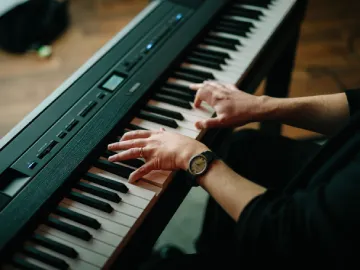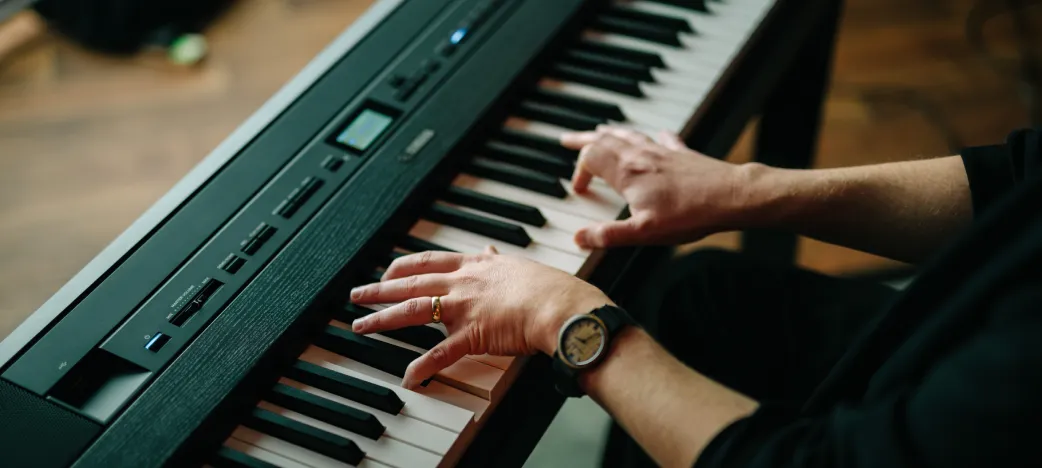Thinking about learning piano but not sure what kind of instrument to get? A full digital piano? A smaller keyboard? There’s a lot out there — but finding the best keyboard to learn piano doesn’t have to be complicated. This guide breaks down the pros, cons, and available options to help you pick the setup that fits your goals, space, and budget.
- Digital piano: the modern alternative
- Keyboard: the versatile virtuoso
- Digital piano vs keyboard comparison
- How to choose the best keyboard for learning piano
- Keyboard or piano: which is better for beginners?
- Best keyboards to learn piano (2025)
- Best digital pianos for beginners (2025)
- Final thoughts: what should you choose?
- Learn piano the right way
- FAQs: Keyboard or digital piano
Digital piano: the modern alternative
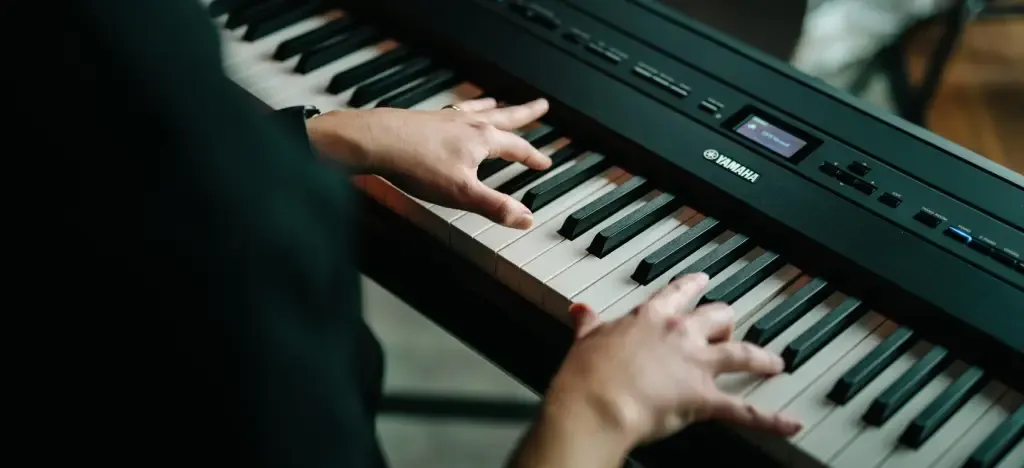 Digital pianos aim to capture the acoustic piano experience while adding modern tech features. Most have 88 fully weighted keys, using hammer-action mechanisms to recreate the resistance and feel of real piano hammers. You also get high-quality piano samples, headphone jacks, and features like metronomes or USB connectivity.
Digital pianos aim to capture the acoustic piano experience while adding modern tech features. Most have 88 fully weighted keys, using hammer-action mechanisms to recreate the resistance and feel of real piano hammers. You also get high-quality piano samples, headphone jacks, and features like metronomes or USB connectivity.
They’re ideal if you want the feel of a real piano but need something more affordable and portable.
✅ PROS: | ❌ CONS: |
|
|
💡 ARTMASTER TIP: Looking for a piano course that works? Learn with David Bennett, Abbey Road pianist and educator with over 1 million subscribers on YouTube. David’s Piano for Beginners course makes it simple, enjoyable, and effective.
Keyboard: the versatile virtuoso
 A keyboard is a fantastic option if you're just starting out and want something affordable, portable, and packed with learning tools. Many entry-level keyboards include light-up keys, built-in lessons, and hundreds of instrument sounds — but not all keyboards are created equal.
A keyboard is a fantastic option if you're just starting out and want something affordable, portable, and packed with learning tools. Many entry-level keyboards include light-up keys, built-in lessons, and hundreds of instrument sounds — but not all keyboards are created equal.
For learning piano properly, it’s best to choose a keyboard with at least 61 full-size keys and touch sensitivity (where the sound changes based on how hard you press). Even better if the keys are semi-weighted or fully weighted.
✅ PROS: | ❌ CONS: |
|
|
 💡 Want to learn piano songs today?
💡 Want to learn piano songs today?
Meet Artie — the world’s first AI piano teacher that actually listens to your playing and gives real-time feedback to help you improve faster.
Download Artie for free now
Digital piano vs keyboard comparison
For most, an acoustic piano just isn't practical, especially in terms of size, cost, and maintenance, so let's take a look at the key features of a digital piano vs a keyboard.
Feature | Digital Piano | Keyboard |
|---|---|---|
Key Action | Fully weighted (like acoustic piano) | Usually unweighted or semi-weighted |
Sound Quality | High-quality sampled piano sounds | Wide range of electronic instrument sounds |
Best For | Learning piano seriously | Playing casually or experimenting |
Portability | Less portable | Extremely portable |
Price Range | Mid to high | Low to mid |
Features | Metronome, headphone jack, USB/MIDI | Extra features, sequencers, auto-accompaniment |
How to choose the best keyboard for learning piano
If you're starting your piano journey on a keyboard, you want something that feels good, sounds decent, and doesn't make learning harder than it needs to be. Here's how to choose the right one:
1. Decide what kind of instrument you need
Keyboards are usually more portable and affordable, while digital pianos aim to replicate the feel of an acoustic piano. If you're short on space or unsure how committed you are, a basic keyboard can be a great start. But if you're in it for the long haul, a digital piano might be the better investment.
2. Go for full-size keys
Look for a keyboard with 88 keys (the same as a real piano). If that’s not possible, 61 or 76 keys is fine to begin with — but full-size keys (not mini keys) are essential for developing good hand shape and finger control.
3. Check for touch sensitivity
Touch-sensitive keyboards respond to how hard you press the keys, giving you dynamic control over volume — just like a real piano. This helps you develop better technique and musical expression.
4. Choose weighted keys if possible
Weighted keys are designed to feel more like an acoustic piano. They require more finger strength and offer resistance, which helps you build proper playing habits from day one. If you can afford a keyboard with semi-weighted or fully weighted keys, it’s worth it.
5. Think about practice features
Built-in metronomes, lesson modes, and recording options can make practice more fun and effective. A headphone jack is also a bonus if you want to play quietly.
6. Set a realistic budget
You don’t need to spend a fortune. Many excellent beginner keyboards cost between $150–$400, depending on features and key quality. Try to choose a model from a trusted brand like Yamaha, Casio, or Roland.
💬 Ask ChatGPT: Whats the best way to learn piano at home?
Keyboard or piano: which is better for beginners?
This is a common question and really depends on your goals.
For serious classical training: If the goal is to pursue classical piano seriously, starting on a digital piano with weighted keys might be best. This ensures that you develop the correct technique and finger strength from the beginning.
For general music appreciation or contemporary music: A keyboard or an entry-level digital piano might be more suitable. These options allow exploring a wide range of sounds and genres without a significant initial investment.
💡 ARTMASTER TIP: Did you know that a recent study found that one instrument in particular — the piano — appeared to have the most benefits. Find out more about how learning music benefits the brain and body.
Best keyboards to learn piano (2025)
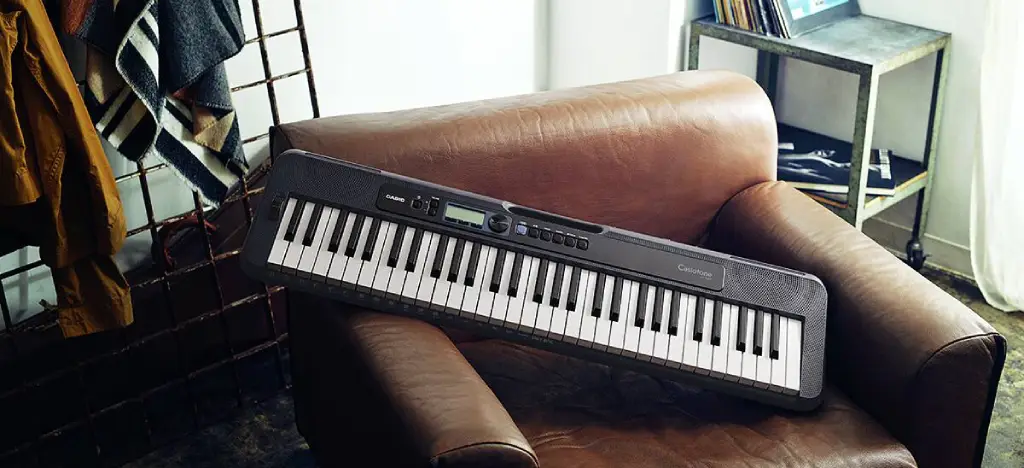 These keyboards are ideal for beginners seeking portability, affordability, and features that support learning.
These keyboards are ideal for beginners seeking portability, affordability, and features that support learning.
✅ Yamaha NP-15
Keys: 61 full-size, non-weighted
Features: Lightweight design, 15 voices, AWM Stereo Sampling
Ideal for: Beginners needing a simple, portable keyboard
Price: Approximately $300
✅ Casio CT-S1
Keys: 61 full-size, touch-sensitive
Features: 61 tones, built-in speakers, compact design
Ideal for: Learners wanting a stylish, space-saving keyboard
Price: Approximately $200
✅ Roland GO:KEYS 3
Keys: 61 full-size, velocity-sensitive
Features: Over 1,000 sounds, Bluetooth connectivity, loop mix function
Ideal for: Beginners interested in music creation and experimentation
Price: Approximately $350
Best digital pianos for beginners (2025)
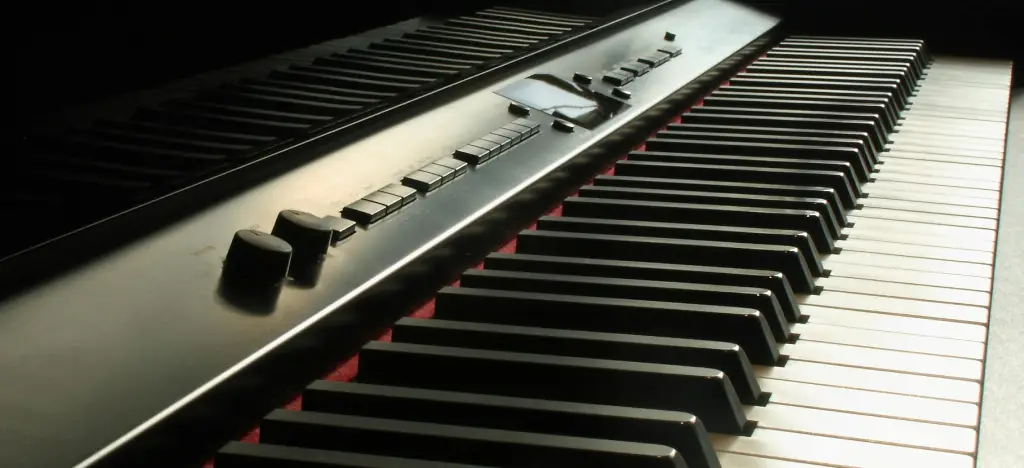 These digital pianos offer a more authentic piano experience, with weighted keys and high-quality sound, suitable for serious learners.
These digital pianos offer a more authentic piano experience, with weighted keys and high-quality sound, suitable for serious learners.
✅ Yamaha P-145
Keys: 88 fully weighted, Graded Hammer Compact action
Features: 10 voices, compact design, USB to Host connectivity
Ideal for: Beginners seeking a realistic piano feel in a portable format
Price: Approximately $500
✅ Roland FP-30X
Keys: 88 fully weighted, PHA-4 Standard action
Features: SuperNATURAL sound engine, Bluetooth MIDI/audio, powerful speakers
Ideal for: Learners desiring advanced features and superior sound quality
Price: Approximately $700
✅ Casio Privia PX-S1100
Keys: 88 fully weighted, Smart Scaled Hammer Action
Features: Slim design, AiR sound source, Bluetooth connectivity
Ideal for: Students needing a sleek, modern digital piano with authentic feel
Price: Approximately $650
✅ Kawai ES120
Keys: 88 fully weighted, Responsive Hammer Compact action
Features: Harmonic Imaging sound technology, Bluetooth MIDI/audio, built-in lesson songs
Ideal for: Beginners looking for rich sound and responsive touch
Price: Approximately $900
Final thoughts: what should you choose?
Go for a digital piano if you want realism with fewer headaches.
Pick a keyboard if budget and portability matter most — but aim for one that simulates piano touch as much as possible.
No matter where you start, you’re taking your first step toward something rewarding, creative, and lifelong.
For more piano tips check out:
Find all our guides to learning piano here
Learn piano the right way
Want to make sure you're learning with the best tools and the right technique from day one?
Try David Bennett’s Piano for Beginners course on ArtMaster for free.
Try Our FREE 7-Day Trial!
FAQs: Keyboard or digital piano
What’s the difference between a keyboard and a piano?
A piano is an acoustic instrument with weighted keys and real strings, while a keyboard is electronic, often more portable, and may have fewer keys or no weighted action.
Can I learn piano on a keyboard?
Yes — many beginners start on a keyboard. Just make sure it has full-size keys and, ideally, touch sensitivity to help build proper technique.
Is it better to start with a keyboard or a piano?
Keyboards are more affordable and space-saving, making them ideal for beginners. But if your goal is classical piano or long-term playing, a digital or acoustic piano is often the better choice.
Do I need weighted keys to learn properly?
Weighted keys are recommended because they help you develop finger strength and prepare you for playing an acoustic piano. That said, many beginners start without them and still make great progress.
How many keys should a beginner keyboard have?
A full-size keyboard has 88 keys, like a real piano. Beginners can start with 61 or 76 keys, but 88 keys is ideal if you want to grow into more advanced music.
About the author
Matt Ford is a musician, teacher, writer, and lifelong student of sound.
With years of experience in both performing and teaching, he shares practical advice through ArtMaster to help musicians at every level build skill and confidence in their playing.
